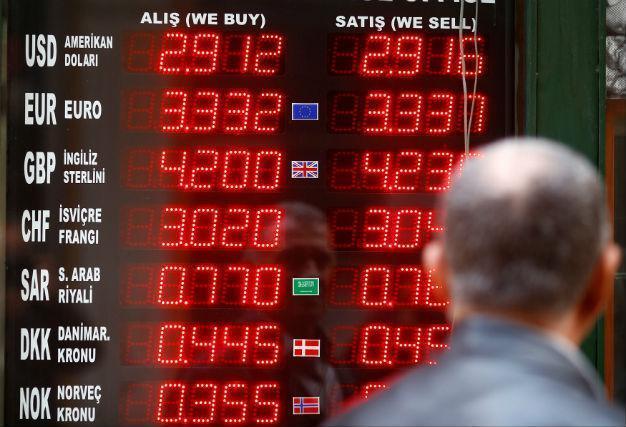Markets, currency ease as Şimşek retains place in Turkey’s new cabinet
ANKARA

REUTERS photo
Markets and the Turkish Lira recovered on May 24 after investor-friendly Deputy Prime Minister Mehmet Şimşek kept his post in government, as well as a number of other key figures in the economic administration.
Şimşek, an anchor of investor confidence and supporter of key structural reforms, was again named as one of five deputy prime ministers.
Although it was not immediately clear whether he would retain overall responsibility for the economy, Prime Ministry sources told state-run Anadolu Agency that Şimşek would remain in charge of economic matters in the new cabinet.
Under pressure along with other emerging currencies, the lira initially fell a quarter percent against the U.S. dollar early on May 24 on fears that Şimşek would be excluded from the new cabinet as well as expectations the Central Bank would cut the upper band of the interest rate corridor.
At noon, the lira firmed to 2.97 against the dollar, from over 3 before the announcement, when it was near its weakest for months.
Shares in Borsa Istanbul also jumped 1.7 percent and 10-year lira yields fell more than 50 bps after initially hitting three-month highs, following the new cabinet announcement.
Strong emphasis on reforms
“Logic prevails – why would [President Recep Tayyip] Erdoğan not keep Şimşek, so as to keep markets and investors on side for the time-being,” Timothy Ash, a strategist at Nomura, said in an e-mailed note, as quoted by Reuters, while sounding a note of caution.
“This is not to say that Şimşek will have that much leverage to deliver on his structural reform plan. The power is moving to Erdoğan and his less orthodox policy advisers,” Ash added.
In the upcoming period, the revival of the reform agenda will be key for the maintenance of Turkish assets and the currency ahead of expected further rate hikes by the U.S. Federal Reserve, according to analysts.
“The existence of familiar names in the new cabinet, especially Şimşek, has helped the lira. We can say that global developments would be more effective upon the currency, rather than domestic developments, as long as political uncertainties are eased ahead of the U.S. Fed’s rate meeting in June. The lira will get stronger as long as fiscal discipline is maintained, the reform process is accelerated, and the Central Bank continues to take rational steps,” said İnci Özbek from Destek Investment in Istanbul in an e-mailed comment on May 24.
In the new cabinet, Finance Minister Naci Ağbal also kept his position.
Nihat Zeybekci, a close Erdoğan ally, returned as economy minister, a post he had held until last November, replacing Mustafa Elitaş.
Erdoğan’s son-in-law Berat Albayrak kept his position as energy minister.
New Prime Minister Binali Yıldırım said on May 24 that his first priority on the economy was growth through production, vowing to encourage investment and employment across the country.
